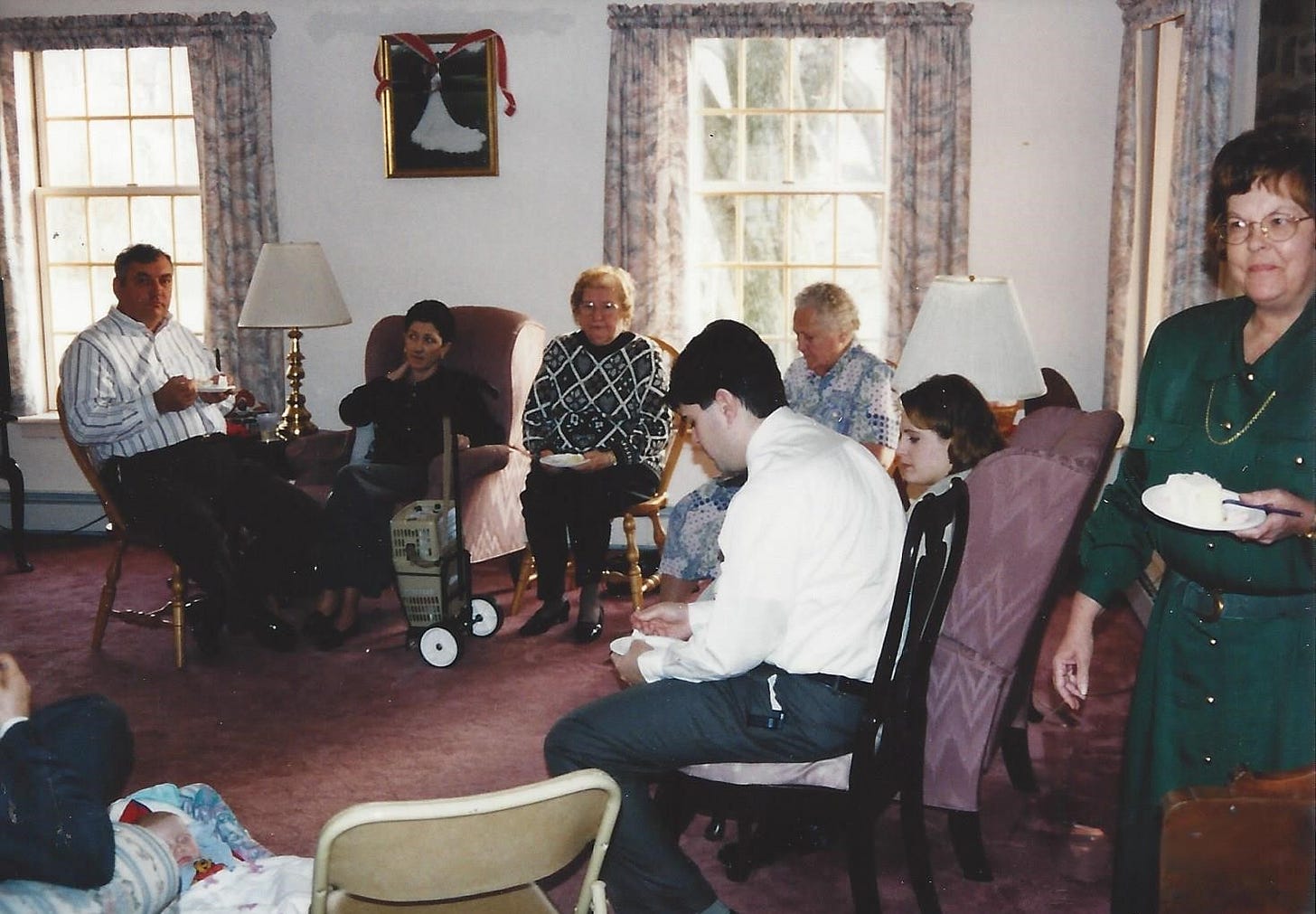Surviving the Inquisition
How to respond to nosy relatives when your personal and professional life is still a work in progress

I was thinking the other day about a strange ritual my best friend was subjected to at my house when we were in high school.
At the time, I wasn’t as forthcoming as my mom would have liked about what was going on in my personal life. It wasn’t that I was hiding anything noteworthy or scandalous. I was just more comfortable keeping the details of my everyday life as a high school student to myself, especially since I knew anything I said could be subject to sarcastic commentary.
My tight-lipped stance drove my mom kind of nuts. She was by nature a curious person who preferred conversation to silence. Since she wasn’t inclined to talk much about herself, she had become a master at “interviewing” others.
My mom was delighted to discover that my friend Marylynn was a much more willing interview subject than I was. Whenever she was at our house, Marylynn happily provided details about what the gang was up to to promote good relations with my mom. And once my mom knew Marylynn was willing to talk, she saw my friend’s visits as opportunities to call her to the witness stand.
Though Mom might have thought she was being sneaky, we all knew what she was up to. One day, my dad must have decided that it was time to fire a warning shot over the bow in the interest of me continuing to have friends.
Marylynn was sitting at our kitchen table when my mom began her line of questioning. Dad interrupted with a “Wait a minute Mary," came over and twisted the pendant light hanging over the table so that its bulbs shone directly into my friend’s eyes. We all laughed. After that, Mom became more judicious about how many questions she asked.
With Thanksgiving on the horizon, perhaps you can relate. At family gatherings, young people are often at high risk of being peppered with questions by older relatives, wondering what they’ve been up to. But fear not–we’ll prepare you to survive The Inquisition.

Why are these people so interested in your life anyway?
Most of the time, when people inquire about your life, it is just a natural curiosity about what’s happening with you. Older people with settled lives don’t have as many exciting things happening in their lives as you do. Many of their days and weeks go on like an endless series of repeats, so they’re eager to hear from people with more going on. In a way, hearing about your adventures offers them a chance to live vicariously through you.
Asking questions can also be someone’s attempt to connect with you. After all, how can they engage with you if they don’t know what’s going on in your life? And you really don’t want to spend all of Thanksgiving talking about the weather–or even worse, politics–do you?
You will be a happier person, and your interactions are more likely to be joyful and life-giving if your baseline assumption is that people mean you no harm when they attempt to converse with you. But let’s set you up for success by reviewing some basic strategies for serving as your own PR rep at the next family function.

Essential Strategies for Surviving the Inquisition
The smartest defense is a good offense. In the coming days, think about one or two things about your life that you’re happy to share with your Thanksgiving tablemates. In other words, if a reporter showed up at your place with a film crew, what interesting stories might you have to share? These pre-planned stories will give you something to work with when the inevitable “So what are you up to?” comes your way.
For instance, if you are less than satisfied with your current job or currently unemployed, it may help to be able to articulate a narrative about what you’re up to that sits well with you. You don’t have to pretend that you love a job that you don’t. But you also don’t have to cop to a defeatist narrative either.
So perhaps come up with (1) One sentence that describes in simple terms what you’re doing for a living; (2) A sentence that describes either one positive about your job or that explains how you landed where you did; and possibly (3) A sentence that describes the sort of job you’d love to be telling them you have when you see them next Thanksgiving. Who knows? Maybe even the process of crafting this narrative may help you accept where you are now and gain some clarity about what your next move might be.
Of course you have to be prepared for the fact that someone may pose a question you might prefer not to answer. The critical thing to remember is this: Don’t assume that your tablemates are asking questions to be mean or hurtful. Aunt Sally probably has no idea that your boss reamed you out last week. And Aunt Jean is probably only asking about your relationship status because she loves to polka and hopes to dance at your wedding someday.
If your relative asks about an area of life you don’t care to discuss right now–you have two basic options:
Change the subject. If you’re really not up for a conversation about a particular aspect of your life, or the inquiring mind who wants to know more isn’t the person you want to engage with right now, this may be your best course of action. If you sense that someone doesn’t have your best interests at heart or the conversation about that subject is unlikely to go well, divert to another path.
Turn the questioning into a conversation. This tactic requires courage but can help get you off the hot seat. The secret is sharing a little about yourself and then asking the questioner a question. You might not want to try this with a relative who’s too free with their opinions. But if you turn their query into a conversation, they might have something worthwhile to share.
Finding the right words to engage in this way can seem scary, so let’s run through a few examples.

Scripts for turning the tables on questioners
When you just broke up with your significant other
Relative: So–do you have a boyfriend?
You: No. I just broke up with someone I’d been dating for a year. I’m dreading the idea of dating again. It can be so hard to meet people. How did you meet people when you were my age?
When you don’t have a significant other
Relative: So–do you have a girlfriend?
You: No. I’d like to meet someone because I would love to have a family someday. But you can’t always find what you’re looking for right away. How did you meet your husband?
When your job doesn’t match your long-term career aspirations
Relative: So–where are you working?
You: I’m currently working at [fill in the blank]. It’s an interesting job because [fill in the blank with some aspect about your job that’s positive, unexpected, or some other perfectly valid reason you’ve taken this job]. I’m not sure yet how long I’ll stay there. Eventually I think I might like to work [fill in the blank with whatever your career aspirations are at the moment]. But I’m finding it hard to figure out what sort of work I’d like to do for the long term. I’m curious–how did you find your way to what you do/did?
When you’ve lost your job
Relative: So–how’s work going?
You: I don’t know whether you heard, but I just lost my job. My employer made some cutbacks, and unfortunately, I was one of the people who got cut.
Relative: I’m sorry to hear that.
You: I am doing everything I can to find a new job, but sometimes a job search takes longer than you would like. I would like to work in [fill in the blank]. Do you happen to know anyone who works in this field?
When you’re just not ready to talk about whatever
Relative: So–how’s [fill in the blank with whatever topic is sensitive for you at present]?
You: Well, that’s a bit of a sore subject for me right now. How are you doing?
You’ll notice that all of the scripts require you to be a bit vulnerable and share about a situation that may be sensitive or painful for you. It may feel risky. But that’s how the magic happens–when we’re honest enough to share what’s happening in our lives, empathy kicks in. The other person can relate to our pain or difficulties and wants to help or will at least treat us gently. People are more likely to console you if they know that you’re going through something hard.
Being honest with people is one of the ways that grace enters in. Give the other person an opportunity to assist–even if all they do is listen. You never know–people might surprise you.

How to turn your holiday conversations into an improv game
Relaxing and having a good time at a gathering may be easier if you think of your conversations as an improv game. In her book Bossypants, Tina Fey laid out some rules for improv that can apply to any encounter with curious relatives.
While you don’t have to take Tina’s first rule of improv–”Just agree”--literally, it’s a good reminder of the tone you should strike in most conversations. Keep an open mind and trust that the other party means well.
The second rule of improv–”Yes, and”-- reminds us that a conversation is a two-way street. Responding to a query is a start. You can choose what to say and how much to share, but you should contribute something.
Your great-aunt might not know the third rule of improv–”Make statements”-- because then she would know that she shouldn’t always be the one asking questions because it puts too much pressure on the other person. But you can help your aunt learn how this works. After you share a bit of your story, ask your inquisitor a question.
The final rule of improv is the most important one: ”Remember there are no mistakes, only opportunities.” Even if the conversation goes in a direction you didn’t anticipate, it doesn’t mean it’s a bust. Perhaps the mistake will turn into a happy accident. Or if the conversation derails and someone says something completely ridiculous, at least you’ll have a great story to tell your friends when you’re commiserating at Friendsgiving.
And by the way, conversational improv is a valuable life skill to develop. You’re likely in for a few more years of questioning by relatives, so you might as well get better at dealing with it. That way, you’ll be better prepared to deal when you settle down and people start inquiring about when you might hear the pitter-patter of little feet around your house.

Dr. Jody Foster helps us understand schmucks––the stupid, foolish, or unlikeable persons we may encounter in the workplace. She explains why they act as they do and suggests practical tips for dealing with them and the problems they create. Each issue this month (and next), we’ll sample Foster’s book, profiling a type of workplace schmuck. This week, the Distracted:
In the olden days, moms used to clip newspaper articles for their kids if they thought it was something they needed to know. I’m watching for things you might have missed that may be helpful to you.
This week’s clips:
Babs, your virtual grandma, shares everything you need to plan and prep a holiday meal in her ultimate Thanksgiving Guide.
An elf doll meant as a joke almost tore one family apart. A family member explains what happened and suggests how to avoid a similar fate this holiday season.
A quarter of U.S. adults report being estranged from an immediate family member. While healthy boundaries can protect us, one writer considers what we lose when we cut family members out of our lives.









Brilliant! Love the recommended responses and the proactive news that can move the conversations right along!
Your pictures of family gatherings over the years could easily be mine! So many familiar scenes of older relatives, questionable attire choices and yes, those folding chairs. Thanks for the great tips on "controlling your narrative" during these inquisitions.
I'll add a new one to the mix: answering questions about my adult son's life when he's going through a breakup, career shift and some other (all good) growth stuff. My go-to is to answer, "He's great, he's been making changes and doing a lot of good things right now." Any further interrogation gets the answer, " You know, that's his story to tell. And I'm sure at some point, he'll tell you."